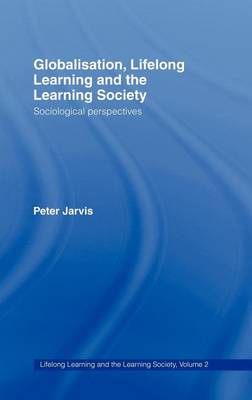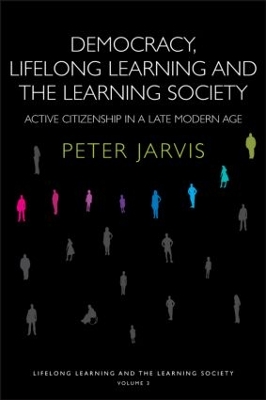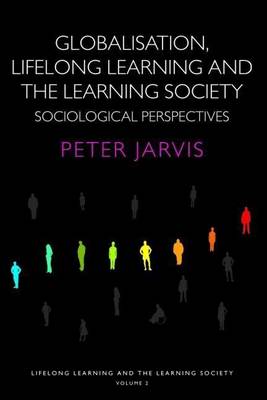Lifelong Learning and the Learning Society
1 primary work • 5 total works
Book 2
This book critically assesses the learning that is required and provided within a learning society and gives a detailed sociological analysis of the emerging role of lifelong learning with examples from around the globe. Divided into three clear parts the book:
- looks at the development of the knowledge economy
- provides a critique of lifelong learning and the learning society
- focuses on the changing nature of research in the learning society.
The author, well-known and highly respected in this field, examines how lifelong learning and the learning society have become social phenomena across the globe. He argues that the driving forces of globalisation are radically changing lifelong learning and shows that adult education/learning only gained mainstream status because of these global changes and as learning became more work orientated.
This is a book with a difference: it produces a completely new perspective on lifelong learning and the learning society and locates them within humanity itself. Five themes run through this book:
- Humankind has always been aware of the imperfections of human society: as a consequence, it has looked back to a mythological past and forward to a utopian future that might be religious, political, economic or even educational to find something better.
-
Lifelong learning as we currently see it is like two sides of the same coin: we learn in order to be workers who produce, and learn we have a need to consume. We then devour the commodities we have produced, whilst others take the profits!
- One of the greatest paradoxes of the human condition has been the place of the individual in the group/community, or conversely how the groups allow the individual to exist rather than stifle individuality
- Modernity is flawed and the type of society that we currently have, which we in the West call a learning society, is in need of an ethical overhaul in this late modern age.
- There is a need to bring a different perspective - both political and ethical - on lifelong learning and the learning society in order to try to understand what the good society and the good life might become.
In Democracy, Lifelong Learning and the Learning Society, the third volume of his trilogy on lifelong learning, Professor Jarvis expertly addresses the issues that arise from the vision of the learning society. The book concludes that since human beings continue to learn, so the learning society must be a process within the incomplete project of humanity.
All three books in the trilogy will be essential reading for students in education, HRD and teaching and learning generally, in addition to academics and informed practitioners.
The Lifelong Learning and the Learning Society Trilogy
Volume 1: Towards a Comprehensive Theory of Human Learning
Volume 2: Globalisation, Lifelong Learning and the Learning Society
Volume 3: Democracy, Lifelong Learning and the Learning Society
Peter Jarvis is an internationally renowned expert in the field of adult learning and continuing education. He is Professor of Continuing Education at the University of Surrey, UK, and honorary Adjunct Professor in Adult Education at the University of Georgia, USA.
As interest grows in theories of lifelong learning not only across society but also as an area of serious academic study, the need has arisen for a thorough and critical study of the phenomenon. This distillation of the work of renowned writer Peter Jarvis addresses this need, looking at the processes involved in human learning from birth to old age and moving the field on from previous unsystematic and mainly psychological studies. Instead, Jarvis argues that learning is existential, and so its study must be complex and interdisciplinary.
The result is a giant step towards building a complete and integrated theory of how humans learn, taking account of existing theories to see if they can be reconciled with a more complex model. Applying his expert analytical approach to this wide-ranging topic, Jarvis looks in detail at:
- learning in the social context
- the transformation of experience
- the outcomes of learning
- learning and action
- cognitive theories
- emotions and learning
- experiential learning.
Lifelong Learning and the Learning Society Complete Trilogy Set
by Peter Jarvis
With the release of the final volume of his trilogy, Peter Jarvis completes his comprehensive, multi-disciplinary study of lifelong learning and the learning society. Between them, these three volumes analyse every aspect of learning, from the fundamental psychology of the human drive to learn, to the global sociological apparatus in which learning takes place.
In Volume 1, Towards a Comprehensive Theory of Human Learning, Jarvis demonstrates how learning underpins humanity. By assessing theories of learning across all ages, he constructs a new model for analysing how people learn.
Volume 2, Globalization, Lifelong Learning and the Learning Society, considers the effects on the learning society of sociological structures, politics and economics, alongside the moral and ethical basis of such a society.
In the brand new Volume 3, Democracy, Lifelong Learning and the Learning Society, the arguments of the first two volumes are brought together and furthered, asking what kind of society is possible as a result of learning? The book concludes that since human beings continue to learn, so the learning society must be a process within the incomplete project of humanity.
All three books in the trilogy will be essential reading for students in education, HRD and teaching and learning generally, in addition to academics and informed practitioners.
Peter Jarvis is an internationally renowned expert in the fields of lifelong learning, adult and continuing education and is founding editor of The International Journal of Lifelong Education - published by Taylor and Francis. He is Professor of Continuing Education at the University of Surrey, UK, honorary Visiting Professor at City University and Professor (honoris causa) at the University of Pecs in Hungary.



